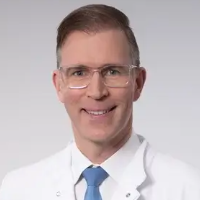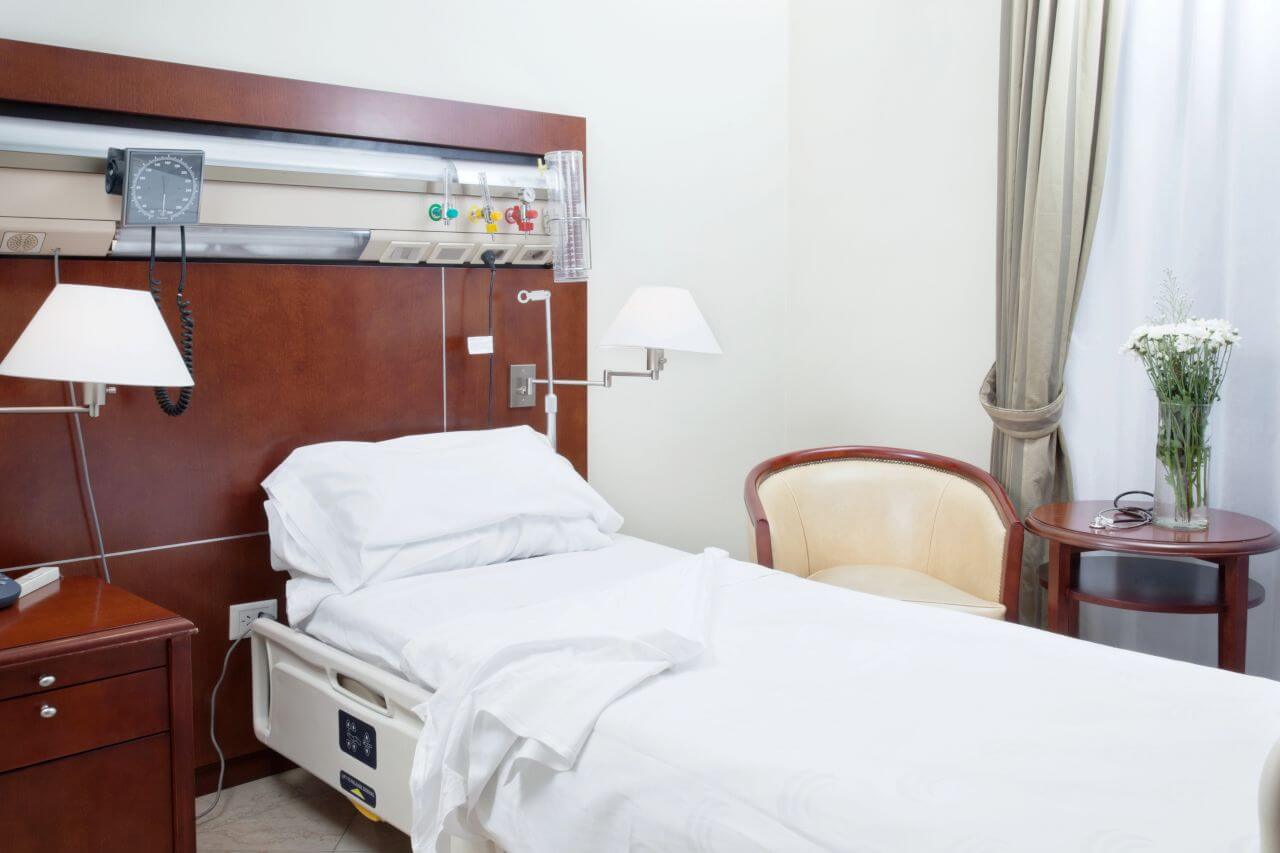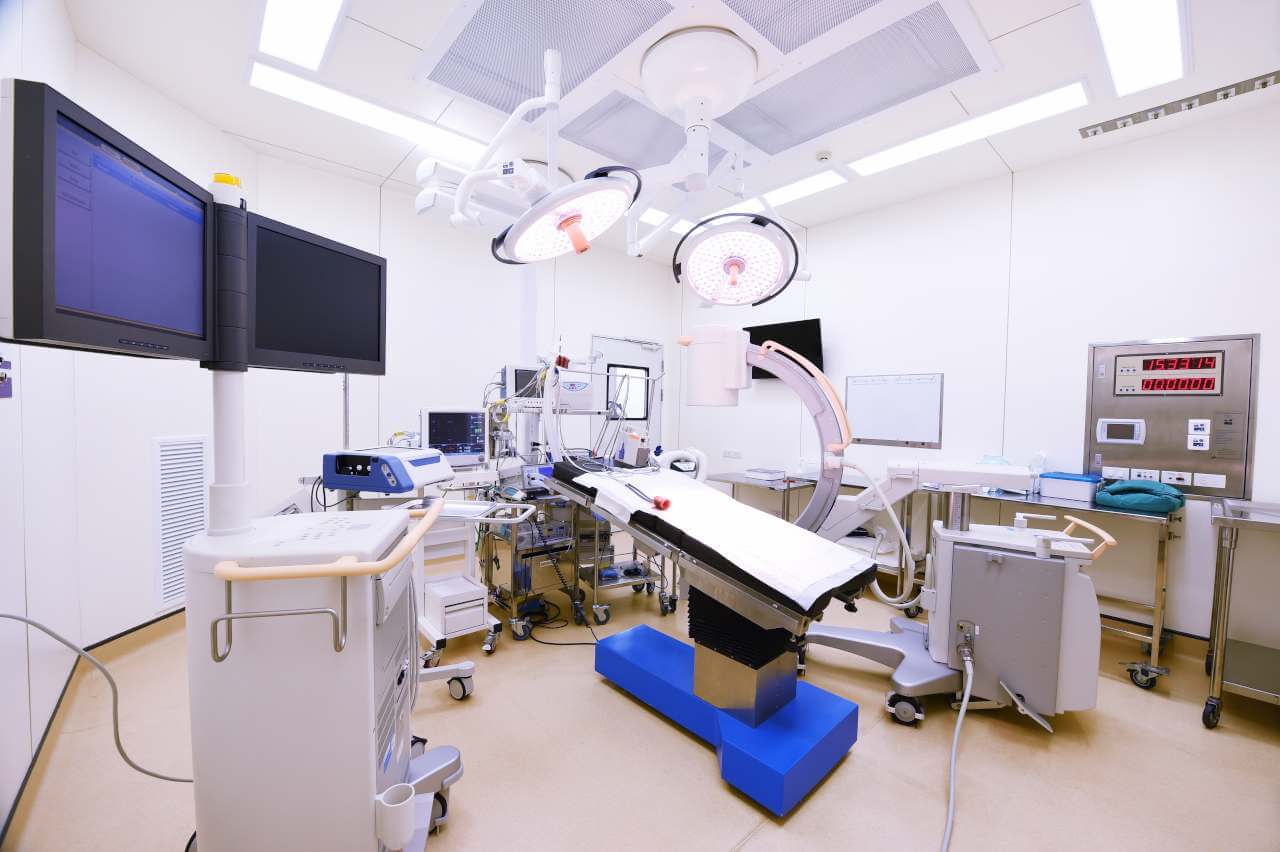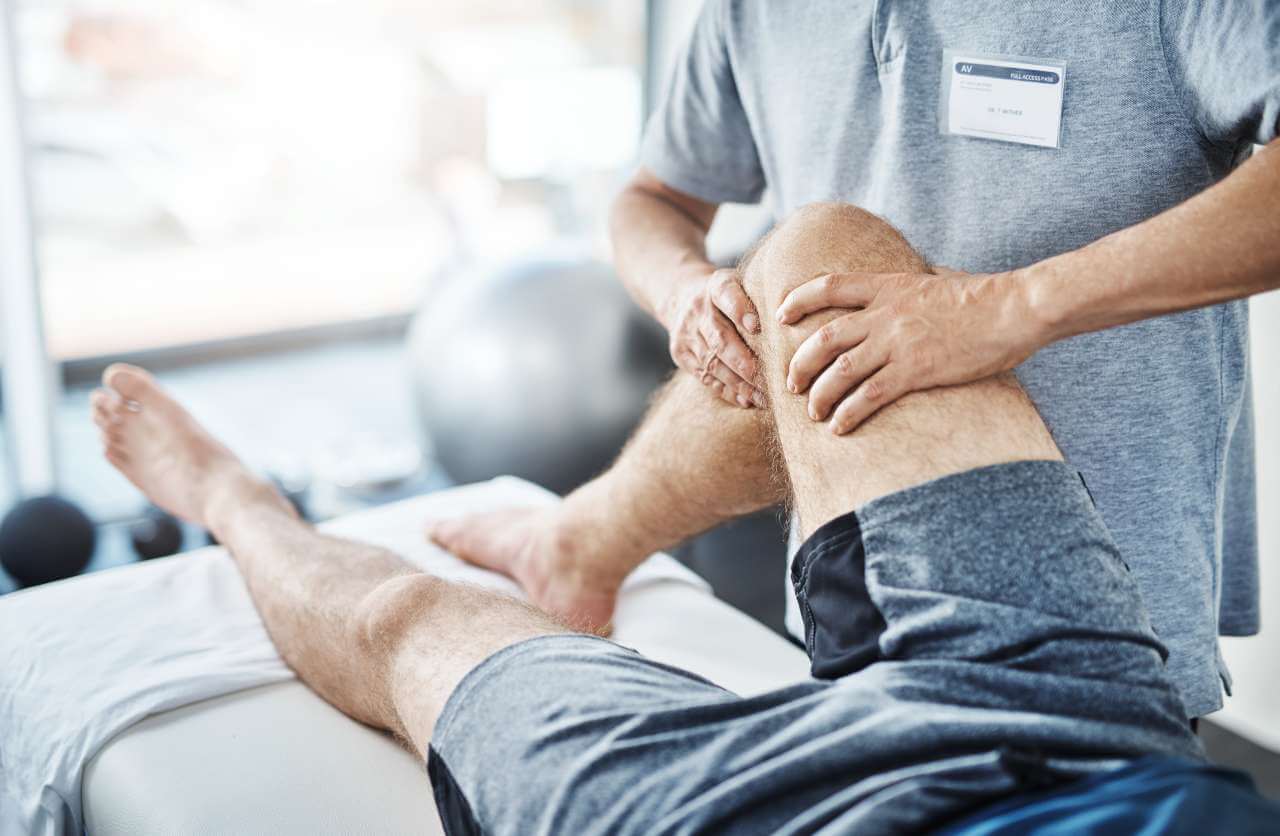
The program includes:
- Initial presentation in the clinic
- clinical history taking
- physical examination
- review of medical records
- laboratory tests:
- complete blood count
- general urine analysis
- biochemical analysis of blood
- indicators of inflammation
- indicators blood coagulation
- x-ray examination
- CT examination
- preoperative care
- resection of necrotic bone and thorough debridement
of intraosseous and soft tissue fistula - symptomatic treatment
- control examinations
- physiotherapeutic procedures
- orthopedic appliances
- the cost of essential medicines and materials
- nursing services
- full hospital accommodation
- explanation of future recommendations
Required documents
- Medical records
- X-ray examination, MRI/CT scan (if available)
Service
You may also book:
 BookingHealth Price from:
BookingHealth Price from:
About the department
The Department of Shoulder, Elbow and Knee Surgery at the Schoen Clinic Duesseldorf offers the full range of medical services in its area of expertise. The doctors at the medical facility are specialized in the conservative and surgical treatment of shoulder, elbow, and knee diseases, with a special clinical interest in the medical care of patients with degenerative changes and traumatic injuries. The department's specialists give preference to sparing treatment that preserves the patient's own joint. Conservative therapy is therefore the first-line treatment wherever possible. A treatment regimen is developed for each patient individually with the participation of experienced physiotherapists. If conservative methods do not lead to the desired result, the doctors move on to surgical interventions. The department has gained successful experience in the field of low-traumatic arthroscopic and minimally invasive operations, the main advantages of which are the absence of severe pain syndrome and rapid recovery in the postoperative period. It is worth mentioning that the medical facility is currently one of the few in Europe to offer the innovative autologous cartilage transplantation procedure using the ACT and OATS techniques.
The department is headed by Prof. Dr. med. Thilo Patzer. This specialist is a certified orthopedic trauma surgeon with additional qualifications in special orthopedic surgery, sports medicine, manual therapy, and special skeletal X-ray diagnostics. Prof. Patzer is certified by the German Association for Shoulder and Elbow Surgery (DVSE) that confirms his exceptional competence in shoulder and elbow surgery. In addition, Dr. Thilo Patzer has been awarded the title of a certified specialist by the German-speaking Working Group for Arthroscopy (AGA).
Patients with shoulder disorders seek medical help from the department almost every day. Special attention is paid to the treatment of rotator cuff tears, biceps tendon ruptures, shoulder instability, frozen shoulder, shoulder arthrosis, shoulder osteonecrosis, and shoulder cartilage lesions. The above-mentioned pathologies cause severe pain syndrome and movement restrictions that have a negative impact on the patient's quality of life. The department's team of doctors boasts exceptional qualifications in their area of specialization, so they can perfectly cope with the treatment of shoulder disorders of any complexity. Each clinical case is considered on an individual basis. Whenever possible, the department's specialists use only a course of conservative treatment, which is based on medication and physiotherapy. If conservative therapy fails, a decision is made to perform a surgical intervention. The department's spectrum ranges from arthroscopic operations to restore damaged articular surfaces to partial and total shoulder arthroplasty using minimally invasive techniques. The operating rooms at the medical facility are equipped with state-of-the-art equipment for arthroscopic and minimally invasive surgeries, which are considered the most sparing surgical techniques available in modern orthopedics. The vast majority of surgical interventions on the shoulder joint are performed on an outpatient basis, with no mandatory hospitalization required.
An integral part of the department's clinical practice is the treatment of elbow diseases such as elbow arthrosis, elbow osteonecrosis, elbow contractures, golfer's elbow, tennis elbow, cubital tunnel syndrome, and other pathologies. Depending on the diagnosis and stage of the disease, both conservative and surgical treatment may be conducted. If surgery is indicated, the department's surgeons prefer arthroscopic or minimally invasive techniques.
The department's range of services includes many procedures for patients with knee diseases. The department's orthopedists treat patients with cruciate ligament ruptures, meniscus tears, patellar dislocations, knee osteonecrosis, and knee cartilage lesions. Surgeries for the above diseases are also performed using low-traumatic techniques.
The department's special offer is cartilage cell transplantation using ACT and OATS techniques. This is an innovative type of treatment for joint cartilage lesions, the essence of which is the elimination of pathologically altered cartilage using the patient's own cartilage cells. Cartilage tissue does not regenerate, but transplantation allows for the growth of a large number of cartilage cells in the laboratory after taking a small amount of autologous (the patient's own) cartilage tissue. The procedure of autologous cartilage cell transplantation is performed using arthroscopic techniques and consists of several stages: cartilage cell harvesting, cell culturing in the laboratory, and implantation of young chondrocytes. The very first results of this treatment can be assessed after a few months, and the final results only after a year. Autologous chondrocyte transplantation is performed only in the most advanced medical centers in Germany. The department successfully performs the procedure to restore cartilage defects in the shoulder, elbow, and knee joints.
The department's clinical focuses include the following:
- Shoulder surgery
- Arthroscopic surgery
- Arthroscopic surgery for rotator cuff tears
- Arthroscopic surgery for biceps tendon ruptures
- Arthroscopic surgery for shoulder instability
- Arthroscopic surgery for frozen shoulder
- Arthroscopic surgery for shoulder osteonecrosis
- Arthroscopic surgery for shoulder arthrosis
- Arthroscopic surgery for cartilage lesions (autologous cartilage transplantation)
- Minimally invasive surgery
- Minimally invasive partial and total shoulder arthroplasty, including revision surgeries
- Minimally invasive surgery for shoulder and shoulder girdle fractures
- Minimally invasive suturing of acute and chronic tendon ruptures of deep shoulder muscles
- Arthroscopic surgery
- Elbow surgery
- Arthroscopic surgery
- Arthroscopic surgery for intra-articular loose bodies
- Arthroscopic surgery for elbow contractures
- Arthroscopic surgery for elbow osteonecrosis
- Arthroscopic surgery for elbow arthrosis
- Arthroscopic surgery for cartilage lesions (autologous cartilage transplantation using the ACT and OATS techniques)
- Minimally invasive surgery
- Minimally invasive surgery for elbow muscle and ligament ruptures
- Minimally invasive surgery for golfer's elbow
- Minimally invasive surgery for tennis elbow
- Minimally invasive for distal biceps tendon ruptures
- Minimally invasive surgery for cubital tunnel syndrome
- Minimally invasive surgery for elbow replacement
- Arthroscopic surgery
- Knee surgery
- Arthroscopic surgery
- Arthroscopic surgery for cruciate ligament ruptures
- Arthroscopic surgery for meniscus tears
- Arthroscopic surgery for intra-articular loose bodies
- Arthroscopic surgery for knee osteonecrosis
- Arthroscopic surgery for patellar dislocation
- Arthroscopic surgery for cartilage lesions (autologous cartilage transplantation using the ACT and OATS techniques)
- Minimally invasive surgery
- Minimally invasive surgery for complex patellar instability
- Minimally invasive corrective knee osteotomy
- Minimally invasive surgery for partial knee replacement
- Arthroscopic surgery
- Other medical services
Curriculum vitae
Professional Career
- Since 2017 Head Physician, Department of Shoulder, Elbow and Knee Surgery, Schoen Clinic Duesseldorf.
- 2010 - 2017 Senior Physician, Head of the Section for Shoulder and Knee Arthroscopy, Sports Orthopedics, University Hospital Duesseldorf.
- 2008 - 2010 Assistant Physician, Department of Trauma Surgery, University Hospital Marburg.
- 2007 - 2008 Assistant Physician, Department of Orthopedics, University Hospital Marburg.
- 2006 - 2007 Assistant Physician, Department of Shoulder and Elbow Surgery, Sports Orthopedics, ATOS Clinic Heidelberg.
- 2004 - 2006 Assistant Physician, Orthopedic Center Sendenhorst.
Board Certification and Qualifications
- Board certification in Orthopedics and Trauma Surgery.
- Additional qualifications in Special Orthopedic Surgery.
- Additional qualifications in Sports Medicine.
- Additional qualifications in Manual Therapy.
- Additional qualifications in Special Skeletal X-ray Diagnostics.
- Certified Specialist in Shoulder and Elbow Surgery, German Association for Shoulder and Elbow Surgery (DVSE).
- Certified Arthroscopy Instructor, German-Speaking Working Group for Arthroscopy (AGA).
Memberships in Professional Societies
- 2016 First Chair of the Shoulder Surgery Committee, German-Speaking Working Group for Arthroscopy (AGA).
- 2014 Member of the Commission for the Expansion of Research Activities of the German Association for Shoulder and Elbow Surgery (DVSE).
- 2009 Member of the European Society for Surgery of the Shoulder and the Elbow (SECEC).
- 2007 Member of the German Association for Shoulder and Elbow Surgery (DVSE).
- 2006 Member of the German-Speaking Working Group for Arthroscopy (AGA).
Photo of the doctor: (c) Schön Klinik Düsseldorf
About hospital
According to the reputable Focus magazine, the Schoen Clinic Duesseldorf is one of the top medical facilities in North Rhine-Westphalia and is also one of the best Spinal Surgery Centers in Germany.
The Schoen Clinic Duesseldorf is recognized as a leading medical facility that provides high-quality medical care with an emphasis on a humane attitude and understanding of each patient's individual needs. The clinic offers a range of medical specialties, including orthopedics, trauma surgery, spinal surgery, otolaryngology, cardiology, internal medicine, angiology, and vascular surgery.
Patients' health is in the safe hands of a highly qualified team of more than 590 physicians and nurses. The clinic treats more than 48,000 patients annually, which is a testament to the high level of patient satisfaction with medical services.
The clinic has a comfortable infrastructure, including modern diagnostic rooms, laboratories, an emergency medical care unit, therapeutic rooms, and operating rooms adapted for low-traumatic surgical interventions. It is worth noting that the clinic has a Center for Arthroplasty that is certified according to the EndoCert standards by the German Society for Orthopedics and Orthopedic Surgery (DGOOC). This is the most prestigious certificate in this medical field in Germany.
The Schoen Clinic Duesseldorf provides comprehensive medical care in accordance with international clinical standards, always taking into account the individual needs and wishes of each patient. The doctors strive to provide patients with the most effective and sparing treatment possible using the very latest therapeutic techniques.
Photo: (с) depositphotos
Accommodation in hospital
Patients rooms
Patients of the Schoen Clinic Duesseldorf live in comfortable single and double rooms designed in light colors. The rooms are furnished with a comfortable, automatically adjustable bed with an orthopedic mattress, a wardrobe, a table and chair, a TV set, a telephone, a mini-fridge, and a safe. Each patient room has an ensuite bathroom with a shower and toilet. The bathroom has changeable towels, a hairdryer, toiletries, and a bathrobe.
Meals and Menus
The patient and his accompanying person are offered three meals a day: breakfast, lunch, and dinner. The patient and his accompanying person have a choice of three set menus daily.
If, for some reason, you do not eat all the foods, you will be offered an individual menu. Please inform the medical staff about your dietary preferences prior to treatment.
Further details
Standard rooms include:
![]() Toilet
Toilet
![]() Shower
Shower
![]() Wi-Fi
Wi-Fi
![]() TV
TV
Accompanying person
Your accompanying person may stay with you in your patient room or at the hotel of your choice during the inpatient program.
Hotel
You may stay at the hotel of your choice during the outpatient program. Our managers will support you for selecting the best option.





